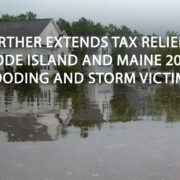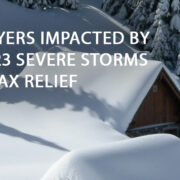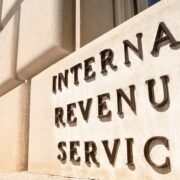Massachusetts taxpayers impacted by September 2023 severe storms and flooding qualify for tax relief
Massachusetts taxpayers impacted by September 2023 severe storms and flooding qualify for tax relief
On May 31, 2024 the Internal Revenue Service (IRS) announced tax relief for individuals and businesses affected by severe storms and flooding that began on September 11, 2023 in Massachusetts. These taxpayers now have until July 31, 2024, to file various federal individual and business tax returns and make tax payments.
The July 31, 2024, deadline will now apply to:
- Individual income tax returns and payments normally due on April 15, 2024. Anyone who needs an additional tax-filing extension beyond July 31 for their 2023 federal income tax return if you have not already filed an extension, should request it by filing a paper copy by July 31. Whether requested electronically or on paper, you will then have until October 15, 2024, to file, though payments are still due on July 31, 2024.
- 2023 contributions to IRAs and health savings accounts for eligible taxpayers.
- Quarterly estimated income tax payments normally due on Sept. 15, 2023, Jan. 16, 2024, April 15, 2024 and June 17, 2024.
- Quarterly payroll and excise tax returns normally due on Oct. 31, 2023, and Jan. 31, 2024 and April 30, 2024.
- Calendar-year partnership and S corporation returns normally due on March 15, 2024.
- Calendar-year corporation and fiduciary returns and payments normally due on April 15, 2024.
- Calendar-year tax-exempt organization returns normally due on May 15, 2024.
Individuals who had an extension to file their 2022 return will also have until July 31, 2024, to file, though payments on these returns are not eligible for the extra time because they were due before the disaster occurred.
In addition, penalties for failing to make payroll and excise tax deposits due on or after September 11, 2023, and before September 26, 2023, will be abated as long as the deposits are made by September 26, 2023.
Other Areas Having Extended Deadlines:
The IRS announced on December 22, 2023 that individuals and businesses affected by severe storms and tornadoes that began on December 9 in parts of Tennessee now have until June 17, 2024, to file various federal individual and business tax returns and make tax payments.
The IRS announced on January 22, 2024 that individuals and businesses affected by severe storms, flooding and a potential dam breach that began on January 10, 2024 in parts of Connecticut now have until June 17, 2024, to file various federal individual and business tax returns and make tax payments.
The IRS announced on January 30, 2024 that individuals and businesses affected by severe storms, flooding and tornadoes that began on September 10, 2023 in parts of Rhode Island now have until June 17, 2024, to file various federal individual and business tax returns and make tax payments.
The IRS announced on February 5, 2024 that individuals and businesses affected by severe storms and flooding that began on December 17, 2023 in parts of Maine now have until June 17, 2024, to file various federal individual and business tax returns and make tax payments.
The IRS announced on February 15, 2024 that individuals and businesses affected by severe storms, tornadoes and flooding that began on August 24, 2023 in parts of Michigan now have until June 17, 2024, to file various federal individual and business tax returns and make tax payments.
The IRS announced and the FTB announced on February 27, 2024 that individuals and businesses affected by severe storms and flooding that began on January 21, 2024 in parts of California now have until June 17, 2024, to file various federal individual and business tax returns and make tax payments.
The IRS announced on February 28, 2024 that individuals and businesses affected by wildfires that began on August 18, 2023 in parts of Washington State now have until June 17, 2024, to file various federal individual and business tax returns and make tax payments.
The IRS announced on March 25, 2024 that individuals and businesses affected by severe storms, landslides and mudslides that began on November 20, 2023 in parts of Alaska now have until June 17, 2024, to file various federal individual and business tax returns and make tax payments.
The IRS announced on May 16, 2024 that individuals and businesses affected by tornadoes that began on March 14, 2024 in Ohio now have until September 3, 2024, to file various federal individual and business tax returns and make tax payments.
IRS Tax Relief Details
The IRS is offering this relief to any area designated by the Federal Emergency Management Agency (FEMA), as qualifying for individual assistance.
For Massachusetts – Currently, relief is available to affected taxpayers who live or have a business in Bristol and Worcester counties.
For Ohio – Currently, relief is available to affected taxpayers who live or have a business in Auglaize, Crawford, Darke, Delaware, Hancock, Licking, Logan, Mercer, Miami, Richland and Union counties.
For Alaska – Currently, relief is available to affected taxpayers who live or have a business in the Wrangell Cooperative Association of Alaska Tribal Nation.
For Washington State – Currently, relief is available to affected taxpayers who live or have a business in Spokane County.
For California – Currently, relief is available to affected taxpayers who live or have a business in San Diego County.
For Michigan – Currently, relief is available to affected taxpayers who live or have a business in Eaton, Ingham, Ionia, Kent, Livingston, Macomb, Monroe, Oakland and Wayne counties.
For Maine – Currently, relief is available to affected taxpayers who live or have a business in Androscoggin, Franklin, Hancock, Kennebec, Oxford, Penobscot, Piscataquis, Somerset, Waldo and Washington Counties.
For Rhode Island – Currently, relief is available to affected taxpayers who live or have a business in Providence County.
For Connecticut – Currently, relief is available to affected taxpayers who live or have a business in New London County, including the Mohegan Tribal Nation and Mashantucket Pequot Tribal Nation.
For Tennessee – Currently, relief is available to affected taxpayers who live or have a business in Davidson, Dickson, Montgomery and Sumner counties.
The current list of eligible localities is always available on the disaster relief page on IRS.gov. The declaration permits the IRS to postpone certain deadlines for taxpayers who reside or have a business in the disaster area.
Tax Planning Tip
Individuals and businesses in a federally declared disaster area who suffered uninsured or unreimbursed disaster-related losses can choose to claim them on either the return for the year the loss occurred (in this instance, the 2024 return normally filed next year), or the return for the current year (2023).
Be sure to write the FEMA declaration number on any return claiming a loss. That number being: “4751-DR” for Tennessee or “3604-EM’ for Connecticut or “4753-DR” for Rhode Island or “4754-DR” for Maine or “4758-DR” for California or “4759-DR” for Washington State or “4763-DR” for Alaska or “4777-DR” for Ohio or “ 4780-DR“ for Massachusetts.
Qualified disaster relief payments are generally excluded from gross income. In general, this means that affected taxpayers can exclude from their gross income amounts received from a government agency for reasonable and necessary personal, family, living or funeral expenses, as well as for the repair or rehabilitation of their home, or for the repair or replacement of its contents.
Additional relief may be available to affected taxpayers who participate in a retirement plan or individual retirement arrangement (IRA). For example, a taxpayer may be eligible to take a special disaster distribution that would not be subject to the additional 10% early distribution tax and allows the taxpayer to spread the income over three years. Taxpayers may also be eligible to make a hardship withdrawal. Each plan or IRA has specific rules and guidance for their participants to follow.
Importance To Preserve Records
Keep in mind that the IRS has up to three years to select a tax return for audit. The FTB has up to four years to select a tax return for audit. In some cases this period is extended to six years. When a taxpayer is selected for audit, the taxpayer has the burden of proof to show that expenses claimed are properly deductible. Having the evidence handy and organized makes meeting this burden of proof much easier.
Essential Records to Have for a Tax Audit
If you are getting ready for a tax audit, one of the most important things to do is gather and organize your tax records and receipts. There’s a good chance that you have a large amount of documents and receipts in your possession. No matter how organized you are, it can be a daunting task to collect the right pieces and make sure that you have them organized and handy for the audit conference.
We have seen many tax audits that hinge on whether or not the taxpayer can provide proper documentation for their previous tax filings. A tax lawyer in Orange County or elsewhere can make sure that the documentation is complete and proper. By submitting this to your tax attorney in advance of the audit, your tax attorney can review your documentation and determine if there are any gaps that need to be addressed before starting the dialogue with the IRS agent.
So what are the most essential tax records to have ahead of your audit? Here are a few must-have items:
- Any W-2 forms from the previous year. This can include documents from full-time and part-time work, large casino and lottery winnings and more.
- Form 1098 records from your bank or lender on mortgage interest paid from the previous year.
- Records of any miscellaneous money you earned and reported to the IRS including work done as an independent contractor or freelancer, interest from savings accounts and stock dividends.
- Written letters from charities confirming your monetary donations from the previous year.
- Receipts for business expenses you claimed.
- Mileage Logs for business use of vehicle.
- Entertainment and Travel Logs for business
Tips On Reconstructing Records
Reconstructing records after a disaster is important for several reasons including insurance reimbursement and taxes. Most importantly, records can help people prove their disaster-related losses. More accurately estimated losses can help people get more recovery assistance like loans or grants.
Whether it’s personal or business property that has been lost or destroyed, here are some steps that can help people reconstruct important records.
Tax records
Get free tax return transcripts immediately using the Get Transcript on IRS.gov or through the IRS2Go app. Tax return transcripts show line-by-line the entries made on your Federal income tax returns. The most three recent tax years are available.
Financial statements
People can gather past statements from their credit card company or bank. These records may be available online. People can also contact their bank to get paper copies of these statements.
Property records
- To get documents related to property, homeowners can contact the title company, escrow company or bank that handled the purchase of their home or other property.
- Taxpayers who made home improvements can get in touch with the contractors who did the work and ask for statements to verify the work and cost. They can also get written descriptions from friends and relatives who saw the house before and after any improvements.
- For inherited property, taxpayers can check court records for probate values. If a trust or estate existed, taxpayers can contact the attorney who handled the trust.
- When no other records are available, people should check the county assessor’s office for old records that might address the value of the property.
- Car owners can research the current fair-market value for most vehicles. Resources are available online and at most libraries. These include Kelley’s Blue Book, the National Automobile Dealers Association and Edmunds.
Develop And Implement Your Backup Plan
Do not wait for the next disaster to come for then it may be too late to retrieve your important records for a tax audit or for that matter any legal or business matter. And if you do get selected for audit and do not have all the records to support what was claimed on your tax returns, you should contact an experienced tax attorney who can argue the application of your facts and circumstances to pursue the least possible changes in an audit.
The tax attorneys at the Law Offices Of Jeffrey B. Kahn, P.C. located in Orange County (Irvine), Los Angeles and elsewhere in California are highly skilled in handling tax matters and can effectively represent at all levels with the IRS and State Tax Agencies including criminal tax investigations and attempted prosecutions, undisclosed foreign bank accounts and other foreign assets, and unreported foreign income. Also if you are involved in cannabis, check out what a cannabis tax attorney can do for you. And if you are involved in cryptocurrency, check out what a bitcoin tax attorney can do for you.











 Follow
Follow Follow
Follow